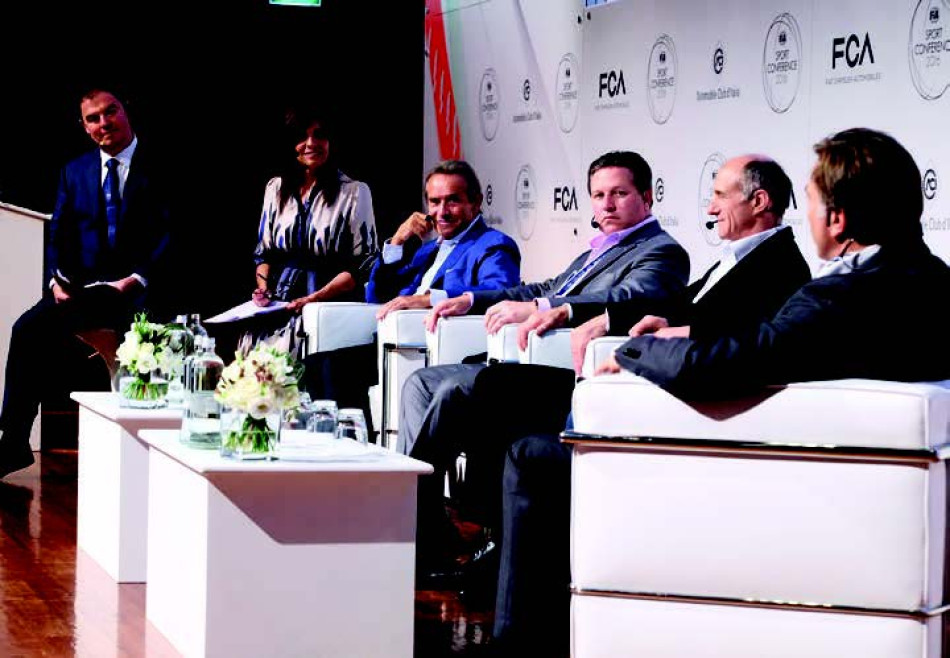A Passion for speed - 2016 FIA Sport Conference

First to take to the stage was fourtime Formula One World Champion and current Scuderia Ferrari driver Sebastian Vettel, who gave a keynote speech which formed the basis of the story on the previous page.
Following this in-depth discussion with a driver at the heart of modern day F1, an amazing array of guests took to the stage to continue the dialogue.
Former McLaren Group Chief Executive Martin Whitmarsh provided some insight into the ways in which motor sport can remain relevant and exciting to a modern audience a topic that was echoed during the following panel discussion.
“Motor racing is a fantastic environment that attracts creative people who want to innovate, be faster and more efficient, so the rules we have in the future have to govern both of these things,” said Whitmarsh.
A panel featuring Jacky Ickx, Zak Brown, Franz Tost, Petter Solberg and Jost Capito then gave a thoughtprovoking commentary on the main subjects of the plenary.
From mystical stories of their first motor sport experiences through to some of their greatest racing and rallying successes, it was a fascinating insight into the worlds of people operating at the highest level of competition.
Topics had a wide range, for example Tost explained what it is he looks for in a potential future F1 star: “The passion is so important – relevant to today – if a driver doesn’t live motor sport 100 per cent they will not become successful. It’s the first indicator for me as to who is going to make it, I watch every session I can, and after about a year you can get a proper picture of a driver.”
Solberg then explained why he thinks FIA World Rallycross is growing so quickly, adding, “In general, the fans have been very important throughout this discussion, but the TV exposure and product is very important to also reach those who are not at the track. You want to get to as many people as possible, and in World RX the action is packaged in such an intense short time of excitement. It is a sport that young kids playing video games understand.”
Through the various stories each speaker recalled, it became clear that the impression motor sport had on all of their lives at a young age was hugely formative, which in turn led the discussion to focus on the areas that the sport and its administrators need to develop in future.
Founder and Executive Chairman of JMI and CEO of Chime Sports Marketing Group, Zak Brown, commented that, “Motor sport is unique in that it has more people who participate in some way than any other sport – almost everyone has driven a car in their life. It also gives you access behind the scenes more than any other sport which is something that organisers need to capitalise on in the future if they’re going to prosper.”
Jost Capito has steered Volkswagen to great success in the World Rally Championship in recent years, and has great experience in the relationship between customers, manufacturers and motor sport. He added, “Showing that you are competitive with other manufacturers is important, and different categories work for different manufacturers. For the big volume companies you need to showcase the product you sell to the customer, but for the prestige brands it’s about showcasing your ultimate technological prowess.”
The importance of the fans and finding the right balance for them is relevant to everything that was discussed, and all the speakers added their opinions on the subject.
Six-time Le Mans winner and undisputed motor sport legend Jacky Ickx commented, “In the end, the judge of the successful event is the spectator. The reason events like Le Mans are successful is because they thought about the human aspect first.” Ickx’s example of Le Mans was undoubtedly fitting, as he was not the only legend on the 24 Hour race on the stage.
In the final part of the session, Emanuele Pirro and Allan McNish took the microphone to analyse the success of an event that, while steeped in history, manages to capture imaginations in the present also.
“This year’s Le Mans was an amazing example of how the heritage of motor sport affects and remains in the present, as Ford and Ferrari did battle again 50 years after their first fight,” said McNish.
“It is undoubtedly an issue that some of us aren’t even able to connect with the current generation, let alone the next one. I don’t think they have the same buzz we had when we started driving, and we need to understand that and provide something for them. In 1980, I was 10 years old, my parents won a competition and we went to the Monaco GP. I remember I was able to walk around and get autographs that connection is critical, but it’s something we’ve stood back from.”
Finally, the five-time Le Mans winner Pirro summed up the Passion for Speed opening plenary session by saying, “I look at the future and see so many new and exciting things, but I hope we do not forget the past. You can buy many things, but never history. Passion is what has driven motor sport in the past, it is what drives it now and it’s what will drive it in the future.”

 Facebook
Facebook Twitter
Twitter






